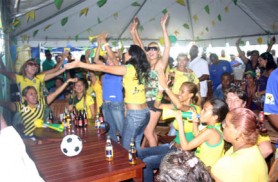JOHANNESBURG, (Reuters) – Five-times champions Brazil began their World Cup campaign yesterday with a surprisingly difficult defeat of North Korea who summoned up some of the spirt of their astonishing run at England 1966.

Two of the world’s most prolific marksmen — Cristiano Ronaldo and Didier Drogba — also made first appearances on Day Five of the tournament but neither could find the net in Portugal’s cagey 0-0 draw with Ivory Coast.
Yesterday’s other game ended 1-1 between fellow underdogs New Zealand and Slovakia, both earning a first ever World Cup point.
While most Africans are jubilant at the first ever World Cup on their continent, there was an horrific turn of events in conflict-torn Somalia where Islamic militants killed two people for breaking a ban on watching games on TV.
The Hizbul Islam group also arrested 35 others.
Though the World Cup is still in its early days, fans and pundits are starting to fret about the lack of goals, and there have been few games or moments to really get the pulse racing.
After 14 matches the net has bulged just 23 times, an average of 1.63 per game — below the 2.30 average for the whole of Germany 2006 and higher figures in previous years.
As well as beating that average, Brazil and North Korea served up one of the most fascinating games of the tournament.
Reviving memories of their 1966 glory run to the quarter-finals, which included a defeat of Italy, the North Koreans held the Samba Boys at bay until the second half, defying some pundits’ predictions of a massacre.
Then in a goal to rival South Africa’s opener as the best of the tournament so far, full back Maicon stunningly drove the ball in from a tight angle to break the North Koreans’ resistance. A second goal from Elano seemed to signal game over, but the North Koreans scored a deserved consolation at the end.
The tournament’s lowest-ranked team were warmly cheered by a small but loyal group of official supporters from the secretive, communist-run nation on a cold night at Johannesburg’s Ellis Park stadium.
For Portugal against Ivory Coast, Ronaldo came closest when he hit the post in Port Elizabeth with a long range shot. Drogba came on as a substitute for Ivory Coast despite a fractured arm.
“To draw against the number three team in the world, it was amazing, you have to be proud,” Drogba said.
To the surprise of many foreign visitors who had been expecting to bask in the African sun, cold temperatures and pouring rain have instead hit the only winter edition of the tournament since 1978, even at the tropical port of Durban.
As well as the lack of high-scoring games, empty seats have been a disappointing feature of the World Cup.
World soccer’s governing body say, however, that attendance levels are the second highest in World Cup history behind the United States in 1994, and blame ticket-holders who have not turned up for leaving seats empty.
Only Germany have shown real World Cup class so far with a 4-0 drubbing of Australia on Sunday that will have surely struck fear into their big name rivals.
While the tournament has largely been joyous and problem free, the hosts were embarrassed by a clash in Durban yesterday between riot police and stadium stewards protesting over wages.
Police said they were taking over security at Durban, Johannesburg, Cape Town and Port Elizabeth stadiums because of the dispute.
Dispute has not been restricted to labour issues, however, and controversy is growing among players and coaches over the World Cup’s new ball, called the Jabulani.
Crosses, free-kicks and long-range shots have been skying over their targets in the thin air.
Another issue is the incessant whine of the vuvuzelas with teams and coaches sometimes reduced to sign language.
But the plastic trumpet, which produces a drone like a swarm of giant bees, clearly has some fans. An iPhone application that copies the noise has been downloaded more than a million times.
Even though the app was designed in the Netherlands, this is unlikely to please Dutch coach Bert van Marwijk, the tournament’s chief curmudgeon and most vociferous critic of the South African fan instrument.

